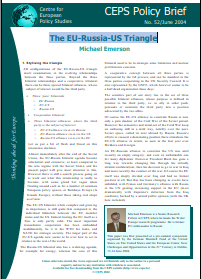№060. Ukraine and the EU after the Orange Revolution
№060. Ukraine and the EU after the Orange Revolution
Author(s): Grzegorz Gromadzki, Oleksandr Sushko, Marius Vahl, Kataryna Wolczuk, Roman Wolczuk
Subject(s): International relations/trade
Published by: CEPS Centre for European Policy Studies
Keywords: Ukraine ; EU ; Orange Revolution;
Summary/Abstract: The outcome of the disputed presidential elections in Ukraine in November 2004 is still highly uncertain. It is however clear that it will have profound consequences for the EU’s relationship with Ukraine. The authors suggest the development of a three-pronged EU approach. First, the EU needs to develop strategies to support the democratic transmission of power from President Leonid Kuchma to his successor. In the event of violence being instigated by the authorities, it is suggested that the EU immediately suspend all contacts with the Ukrainian leadership. If the Supreme Court finds that the result cannot be said to reflect the will of the Ukrainian people, new elections run by the OSCE should be considered. Second, a strategy needs to be formulated to deal with the consequences of a victory for Prime Minister Viktor Yanukovych. It would be imperative that the EU resists the temptation to disengage with Ukraine. The EU would nevertheless need to radically change its policy, for instance by re-targeting economic aid and minimising political dialogue. Third, a strategy needs to be formulated in the event that Viktor Yushchenko wins the presidency. In this case, the EU and Ukraine should in the short-term renegotiate the Action Plan to strengthen bilateral relations. Faced with a pro-European, credible reformist like Mr Yushchenko, with broad domestic support, the EU would in the longer term find it difficult to continue to avoid the question of Ukraine as a potential member of the EU. Date of Publishing: 1 December 2004
Series: CEPS Policy Briefs
- Page Count: 4
- Publication Year: 2004
- Language: English
- Content File-PDF

